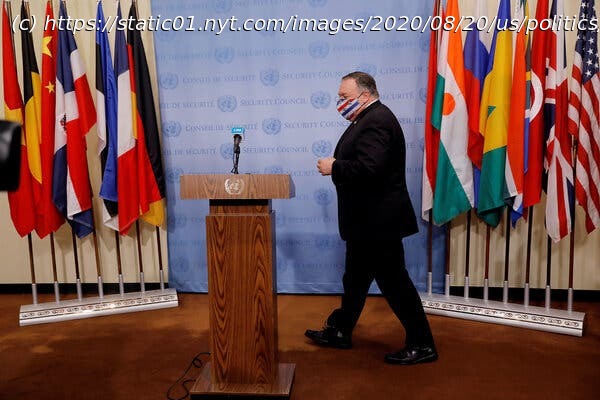Allies and adversaries alike have refused to recognize the Trump administration’s demand for sanctions, potentially weakening American authority worldwide.
A diplomatic standoff over restoring international sanctions against Iran may be the most vivid example yet of how the United States has largely isolated itself from the world order — instead of isolating Tehran, as the Trump administration intended. At nearly every step President Trump has taken in his dogged pursuit to demolish a 2015 accord limiting Iran’s nuclear program, he has run into opposition, including from America’s strongest allies in Europe. On Thursday, the opposition turned into open defiance. Secretary of State Mike Pompeo traveled to New York to personally demand that the United Nations Security Council “snap back” the sanctions on Iran for violating some terms of the nuclear deal. The act was born of frustration: His closest allies had rejected an American effort to recast the terms of the deal by extending an arms embargo against Iran that begins to expire in October. Only the Dominican Republic voted with the United States. Mr. Pompeo, sounding incredulous, again accused Iran of fomenting terrorism, destabilizing the Middle East and trying to hide its nuclear and weapons programs from international inspectors. But he directed some of his harshest words toward diplomats from Britain, France and Germany, whom he said “chose to side with ayatollahs.” “It’s not a matter for anger or frustration,” Mr. Pompeo said. “We’ll follow the rules of the U. N. Security Council, and that will lead to the sanctions being reimposed.” Never mind that Iran’s major violations were in response to Mr. Trump’s decision to exit the nuclear agreement. And set aside the legal contortion that underpins America’s insistence that it is still a “participant” in the international accord, with the authority to restore the economic penalties, despite Mr. Trump declaring in 2018 that he was “terminating United States participation.” The bigger issue is that even if Mr. Pompeo succeeds, he may be reimposing sanctions that no U. S. allies are willing to enforce. And that could not only weaken American authority worldwide, it may also show adversaries how to sidestep the United Nations in future global disputes. “We call on all U. N. S. C. members to refrain from any action that would only deepen divisions in the Security Council or that would have serious adverse consequences on its work,” diplomats from Britain, France and Germany wrote in a joint statement issued moments after Mr. Pompeo spoke. They maintained that since the United States left the nuclear agreement, it has no right to act under its provisions. “We cannot therefore support this action,” the European diplomats wrote. The rejection last week by the Security Council of the arms embargo issue has already been wrapped up in election-year politics: Mr. Pompeo was quick to note that the nuclear agreement had been reached by the “Obama-Kerry-Biden” triumvirate.
Start
United States
USA — Political Instead of Isolating Iran, U. S. Finds Itself on the Outside Over...






